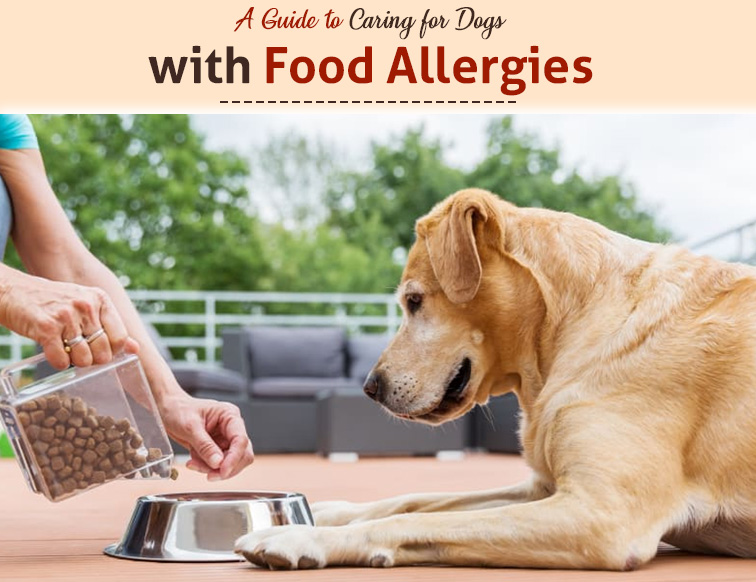A Guide to Caring for Dogs with Food Allergies

We often come across people that are allergic to nuts, milk, and other food items. They always need to be cautious about their food intake as such allergic foods can be very harmful to their health. The same is true for dogs. Therefore, the diet of dogs with food allergies needs special care and attention. This article guides you on how to care for dogs that have food allergies.
What is a Food Allergy?
Food allergies occur when a dog’s immune system misreads a particular substance as an invader rather than a food. This results in the production of antibodies against this food, resulting in allergic reactions. These reactions can range from mild to acute, and sometimes they may also manifest into dangerous conditions like an anaphylactic shock.
Symptoms of Food Allergies in Dogs to Look Out For
Canine food allergies may be fatal if left untreated. Therefore, dog owners should always watch out for the following signs of an allergic reaction:
- Itching
- Hives
- Swelling of face, ears, lips, etc.
- Vomiting
- Diarrhea
- Sneezing
- Runny eyes or nose
- Skin/paw infections
- Lethargy
- Obsessive licking
- Bald patches
- Coughing
- Head shaking
- Low blood pressure
Common Food Allergies in Dogs
The most common food allergens in dogs are proteins and complex carbohydrates found in meat or dairy products. Generally, a dog’s body breaks proteins and carbohydrates into smaller, more digestible forms. However, when these smaller parts are not broken down properly, they are not absorbed by the cells and are seen as intruders.
Although dogs can develop allergies to any food, some common food allergens include beef, chicken, dairy products, soy, lamb, eggs, corn, wheat, pork, fish, etc.
Caring for Dogs with Food Allergies
There is no cure for dog food allergies. Preventive care is the best way to save your dog from food allergy reactions. Here are some useful tips for caring for dogs having food allergies.
- You can simply recognize the allergen by being watchful of the ingredients of the food that you feed to your furry friend and prevent allergies by eliminating that ingredient. However, it is not as easy as that. The substance that causes food allergies may be difficult to diagnose, so you must always seek your veterinarian’s help for the diagnosis.
- If you spot any symptoms of food allergies in dogs, remember to maintain a log of dietary history and symptoms. This should include everything that goes into your dog’s system, including food, treats, liquids, etc. A veterinarian can design an elimination diet based on this data, which can help identify the potential food allergen.
- Once the allergen is recognized, it is best to avoid it in every possible way. Avoid the allergen by completely eliminating the ingredients from your dog’s diet. So, if you are offering a new treat to your dog or are considering switching your dog’s food, always read the ingredients on the package to ensure that it doesn’t contain the substance that your dog is allergic to.
- Your dog’s immune system plays an important role in allergies. Your veterinarian can also recommend some supplements like Omega-3 oils or digestive supplements like probiotics, which help strengthen the immune system, thereby assisting with the control of food allergies.
- Always keep your dog’s anti-allergic treatments in stock. Because, no matter how careful you are about your dog’s dietary choices, accidental exposure to allergens is always possible. Treating your dog immediately may help in ceasing the symptoms of food allergies.
- Some dog breeds are more prone to food allergies, but this can vary by state or country. These breeds include Dachshunds, German Shepherds, Cocker Spaniels, etc. Sometimes local breeders are more aware if they are breeding a line known for its allergies. Identifying if your dog is more prone to allergies helps you take better care of them.
